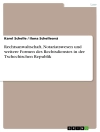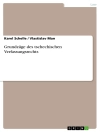The volume explores the consequences of recent events in global Internet policy and possible ways forward following the 2012 World Conference on International Telecommunications (WCIT-12). It offers expert views on transformations in governance, the future of multistakeholderism and the salience of cybersecurity. Based on the varied backgrounds of the contributors, the book provides an interdisciplinary perspective drawing on international relations, international law and communication studies. It addresses not only researchers interested in the evolution of new forms of transnational networked governance, but also practitioners who wish to get a scholarly reflection on current regulatory developments. It notably provides firsthand accounts on the role of the WCIT-12 in the future of Internet governance.
Tabela de Conteúdo
Introduction: Global Internet Policy: a Fifteen-Year Long Debate
.- Part 1. Actors, Institutions and Principles of Internet Governance.- Chapter 1 Global Internet Governance: Governance without Governors.- Chapter 2 Competing Institutional Trajectories for Global Regulation—Internet in a Fragmented World.- Chapter 3 Internet Freedom and the Constitutionalization of Internet Governance.- Part 2. Multistakeholderism and its Limits.- Chapter 4 Internet Governance: The Last Gasp of Colonialism, or Imperialism by Other Means?.- Chapter 5 Visions of Political Power: Treaty Making and Multistakeholder Understanding.- Chapter 6 Use [and Abuse] of Multistakeholderism in the Internet.- Part 3. Internet Security between Competition and Cooperation.- Chapter 7 Chinese Internet Governance—Some Domestic and Foreign Issues.- Chapter 8 Extending Cybersecurity, Securing Private Internet Infrastructure: the US Einstein Program and its Implications for Internet Governance.- Chapter 9 Open Security.Contributions of Networked Approaches to the Challenge of Democratic Internet Security Governance.- Conclusions and Way Forward. From Nested Dilemmas to Democratic Internet Governance.












